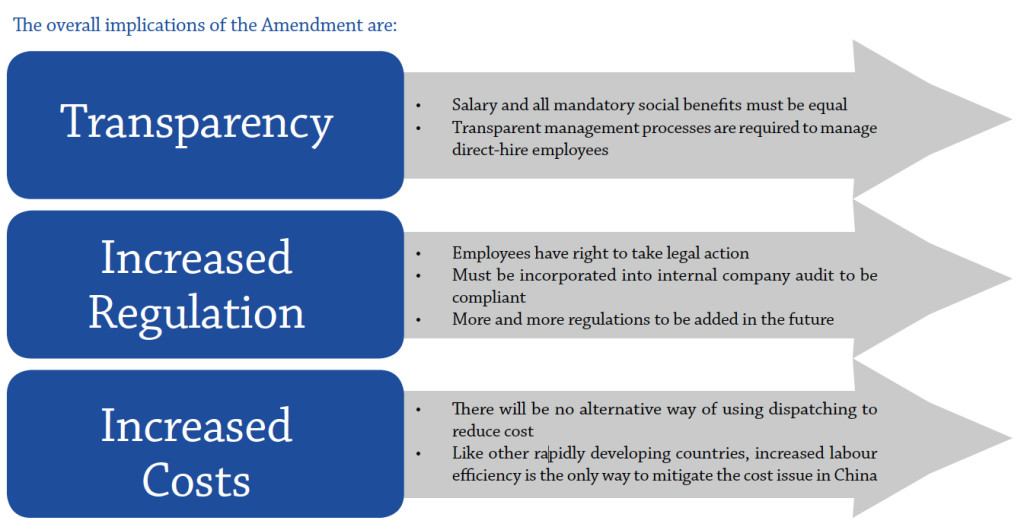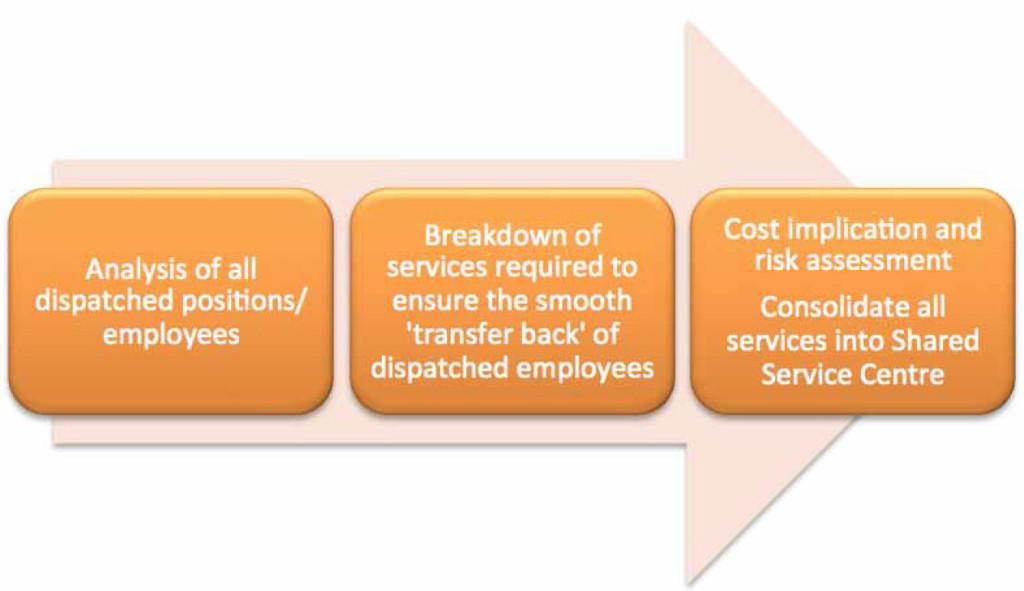An amendment to Chinese Employment Contract Law (the Amendment) provides new challenges for businesses operating in China. It was released by the Standing Committee of the National People’s Congress on 28th December, 2012, and will be implemented on 1st July, 2013.
This is the first amendment to the law, which came into effect on 1st January, 2008. It focusses on the issue of labour dispatch, a term that refers to the practice of hiring employees through an employment service agency as opposed to direct employment. In the following article Ms Wei Lu, founder and COO of CDP Group Ltd in Shanghai, outlines the potentially far-reaching implications and advises companies to start formulating a plan as soon as possible.
 Over the past five years the practice of labour dispatch has been frequently criticised by the media, particularly with regard to the issue of ‘equal pay for the equal work’. The legislature made this Amendment so as to regulate the practice of labour dispatch more strictly, mainly by clarifying and expanding some of the vaguer articles of Employment Contract Law.
Over the past five years the practice of labour dispatch has been frequently criticised by the media, particularly with regard to the issue of ‘equal pay for the equal work’. The legislature made this Amendment so as to regulate the practice of labour dispatch more strictly, mainly by clarifying and expanding some of the vaguer articles of Employment Contract Law.
The situation of dispatching labour is quite unique to China. Initially, as foreign companies could only be registered as representative offices or branches that couldn’t hire employees directly, they were advised to hire employees through government agencies. This changed after WTO when dispatching services were suddenly available on the open market, with much easier entry for dispatching service vendors. Over the past decade it has become common practice for all kinds of companies to use dispatching services.
So what are the implications if the Amendment requires companies to ‘take back’ a huge number of dispatched staff by 1st July of this year when the legislation takes effect? Will companies be able to bear the huge costs involved, or have the capabilities to build the infrastructure to support the management of these employees? What are the long term risks to companies? These are the critical issues that companies need to address.
In summary the major points of the Amendment can be classified into the following four categories:
New requirements for qualification
Labour dispatch providers will now be required:
- To have a minimum registered capital of RMB 2,000,000;
- To establish their internal management procedures and policies specifically for labour dispatch business services. It should closely follow all criteria of the Amendment, and Labour Authorities are empowered to examine and approve new administrative licenses of all labour dispatch businesses.
Many companies now recruit over 70 per cent of their staff from dispatching vendors which include large foreign companies, SOEs and public domestic companies. Logistics, fast-moving consumer goods (FMCG), manufacturing and services are just some of the major industries that now leverage the existing dispatching model to reduce risks or labour costs.
Equal pay for equal work
- Dispatched employees are entitled to receive the same pay as that received by regular employees in the same positions.
- This principal shall be written into the Employment Contract & Labour Dispatch Agreement.
Often vendors are considered qualified, not due to the quality of their service, efficiency and/or their strategic value to customers, but simply due to the fact that they provide labour recruiting services. This has led to many labour abuses and has triggered legal cases on unequal pay, benefits and insurance coverage when comparing dispatched staff to direct-hire staff in equivalent positions.
Dispatch staff can only be appointed to temporary, auxiliary and substitutable positions
- Temporary positions shall not be longer than six months.
- Auxiliary positions are those that support the positions of main business units.
- Substitute positions are those that temporarily replace ‘regular’ employees who are engaged in off-the-job training, leave, or for other reasons which the employee cannot report to work for a fixed period.
Labour dispatch shall be limited to a cap or fixed percentage
- Direct employment should be the main method for hiring employees in China.
- Labour dispatch is merely a supplement to direct employment.
- Employers shall strictly control the number of its dispatched employees, which shall not exceed a fixed percentage. The restricted range can be based on a percentage of the total headcount of an employer. Specific percentages are to be regulated by the Ministry of Human Resources and Social Security.
Based on the Amendment, we suggest that employers should complete internal work prior to 1st July, 2013, as follows:
- Check the current number of dispatched employees.
- Check the percentage of dispatched employees.
- Clarify the necessity of dispatched positions.
- Harmonise the situation of equal work for equal pay.
- Undertake a plan of transition.
The overall implications of the Amendment are:
 At CDP we have been following these trends and changes to the new dispatching policy with great interest, and are heavily involved with our client base to help them transition. We have been providing preliminary solutions, using our in-depth knowledge of HR services and solutions, to help them cope with the inevitable business changes by leveraging end-to-end services.
At CDP we have been following these trends and changes to the new dispatching policy with great interest, and are heavily involved with our client base to help them transition. We have been providing preliminary solutions, using our in-depth knowledge of HR services and solutions, to help them cope with the inevitable business changes by leveraging end-to-end services.
Our suggestion is that HR or company executives ask themselves the following questions before formulating an action plan:
- Do current dispatched employees meet the new criteria for ‘temporary’, ‘auxiliary’ or ‘substitutable’? Should we implement an overall position analysis to define which positions ‘qualify’ for future dispatching?
- How many, and what new, internal positions do we need to create in order to absorb all dispatched employees into ‘regular’ positions?
- What are the cost implications of this absorption process? Do we need to build a service centre, legal team or IT platform, or develop procedures for labour contract management to cope with the changes?
- What would be the most efficient model to manage this group of employees if we have to ‘hire them back’?
- What about the actual recruitment? Can we outsource this or build shared services?
There are many ideas and discussions taking place, and there is still some time to think through the issue and prepare for the change. It never hurts to gather as much information as possible, try new approaches and leverage all internal and external resources to find the best solution that fits you. Some companies may choose to strengthen their internal HR operations by building up HR shared services and adding recruitment channels, some may choose to outsource non-core positions (Position Outsourcing) while others may want to try total outsourcing of services to reduce risks or increase efficiency.
At CDP we advise all employers to pay close attention to this Amendment, the subsequent local detailed regulations, and any updates to the related local judicial guidelines. It seems that the adjustment of employment structures will be a future trend of the Chinese labour environment. Senior executives should take time to think through long-term strategies of their local business and empower their HR to make this transition as smooth and risk-predictable possible. By using this opportunity smartly, companies can also unearth previously unseen risks, find solutions to cost inefficiency and process redundancy with break-through ideas on overall HR management.
CDP Group Ltd is a leading one-stop HR outsourcing provider in Asia and Greater China. CDP provides a full set of comprehensive HR services of payroll outsourcing, benefit outsourcing, HCM on Cloud, HR shared Services, Performance On-demand, Recruitment services, Expatriate Services and other valued added services. Their service empowers companies to manage and optimise their HR management and services through the PEOPLE, PROCESS and PLATFORM model. For more information go to www.cdpgroupltd.com.



Recent Comments